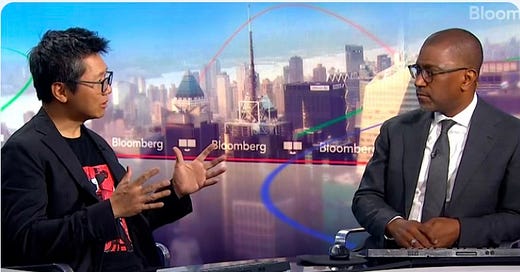Aging Global North versus Still-Youthful Global South
How this plays out -- per an impressive complexity thinker
I recently had a Teams with this guy: Jason Hsu, founder and chairman of Rayliant Global Advisors. Hsu has had a career worthy of an academic (starting with a PhD in finance from UCLA) but decidedly cluttered (deep thinking-wise) with all sort of real-world success in the realm of investment. Think of a younger Ray Dalio, but more scientifically rigorous and transparent in his logic — more accessible, at least to my mode of thinking.
Jason and Rayliant have a cool regular online webinar forum for clients, and I will appear on it with him sometime in next couple of months.
Anticipating that, I checked out his writing and found this stellar bit of work on how aging in developed markets (DMs) will impact emerging markets (EMs) going forward.
I will quote at length from his LinkedIn newsletter:
Demography as “the ultimate slow-motion train wreck,” he begins, part and parcel of why investors can pretty much get away with “ignoring this impending crisis.”
Much like climate change, yes?
I am reminded of Woody Allen’s character in Love and Death: “I’m not afraid of death. I just don’t want to be there when it happens.”
Hsu argues that, regardless of awareness, “this much-ignored distant future is upon us.”
An inevitability.
The easy part to imagine: slower DM growth due to a shrinking workforce. China … already experiencing.
Second easiest to imagine: “EM economies with their younger population will drive future global growth; thus, EM would present a wonderful investment opportunity.”
Then Hsu goes deeper and comes up with the “big takeaway”:
As boomers retire, EM will gain increasing leverage over their older trading partners and extract substantially better terms of trade for their exports. This reverses decades of accepting table scraps, where DM captured much of the trade surplus. This dynamic, coupled with DM’s mounting debt from excessive consumption fueled by printed dollars, suggests that EM assets will appreciate significantly relative to DM assets, largely driven by EM currency revaluation.
Magnificent!
I’ve been looking for this analysis for years, figuring it was instinctively true but having no great expertise to posit the relationship.
When I say that we are finally looking at the emergence of a New International Economic Order (NIEO) of the sort long dreamt-of by the Global South (in the old incarnations of the Non-Aligned Movement and the Group of 77), this is the sort of fundamental market logic that contributes to this reality — hell, forces it into life.
Recall: my big pitch is that a trio of structural changes compel North-South integration:
Climate change hits the South far worse
Demographic aging hits the North far worse
Future global middle-class consumption growth is located more in the Global South than the Global North.
It has always been that third one that I feel shakiest about, but Hsu’s offered logic fits it nicely.
I want the North—>South trade and investment push to be greed-driven, because I know that motivation works.
If those investments flow, then my Middle Earth (30 degrees north and south of the equator) has a fighting chance of getting the money it needs to harden itself against climate change.
Will it be enough?
No. And migrations/depopulation will ensue. The N-S demographic divide likewise demands it.
But that flow can most definitely be sufficient to keep a core population there resiliently in-place. Hell, done right, Middle Earth becomes a big retirement community for people the world over who love the heat (and there will be plenty).
Broader framing: the N—>S investment flow makes the North that much more “invested” (to coin a term) in Middle Earth’s future, and that combination of forbearance and interest (pun intended) can prove crucial to the wider and deeper trade and political integration that will likely be necessary to stabilize Middle Earth as a whole over this century.
As I always say: if you’re a small independent just-getting-by state in Middle Earth, the next five decades are going to be brutal. Your salvation is integrating northward.
Why?
Because you’re like a health insurance-seeking patient with pre-existing conditions that are only going to get worse. If your pain can’t be balanced by integration with Northerners who are (unfairly) being empowered by climate change, then your future is bleak.
Socialize the problem.
But if Hsu’s logic holds, then that money flow is a huge enabler for the greater integration desired.
Other Hsu bits:
Keep reading with a 7-day free trial
Subscribe to Thomas P.M. Barnett’s Global Throughlines to keep reading this post and get 7 days of free access to the full post archives.



